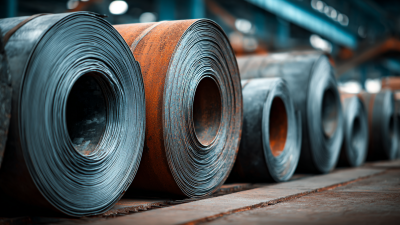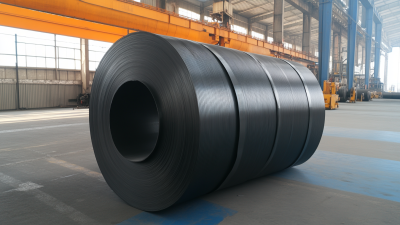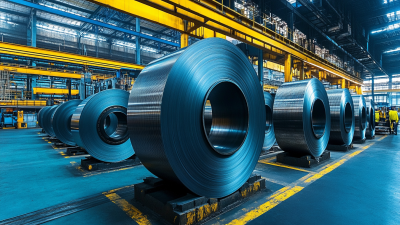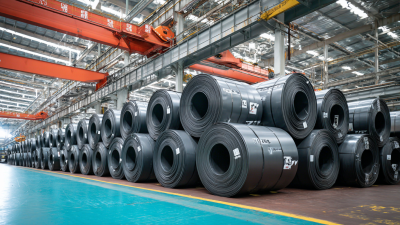The global supply chain landscape is continuously evolving, particularly in the context of raw material utilization.
 Width Carbon Steel Coil, a key component in various manufacturing processes, has garnered significant attention due to its versatility and efficiency.
According to a recent report by the World Steel Association, the demand for carbon steel products is expected to increase by 1.8% annually through 2025, driven by rising needs in the
automotive and construction sectors. This raises the importance of understanding how Width Carbon Steel Coil can enhance operational efficiencies and supply chain resilience.
By integrating such materials, industries can not only optimize production costs but also improve delivery timelines.
As global competition intensifies, the strategic adoption of Width Carbon Steel Coil within supply chains becomes a vital consideration for manufacturers aiming to maintain their edge.
Width Carbon Steel Coil, a key component in various manufacturing processes, has garnered significant attention due to its versatility and efficiency.
According to a recent report by the World Steel Association, the demand for carbon steel products is expected to increase by 1.8% annually through 2025, driven by rising needs in the
automotive and construction sectors. This raises the importance of understanding how Width Carbon Steel Coil can enhance operational efficiencies and supply chain resilience.
By integrating such materials, industries can not only optimize production costs but also improve delivery timelines.
As global competition intensifies, the strategic adoption of Width Carbon Steel Coil within supply chains becomes a vital consideration for manufacturers aiming to maintain their edge.
Width Carbon Steel Coil has become an essential element for global supply chains due to its unique properties. This material is favored for its strength, durability, and versatility, making it suitable for various applications, from construction to manufacturing. Its ability to withstand heavy loads, combined with resistance to corrosion and wear, ensures that goods transported using this type of steel remain intact and functional, even in challenging environments.

When incorporating Width Carbon Steel Coil into supply chains, consider these tips: First, assess the specific requirements of your project to determine the appropriate gauge and width necessary for your operations. This will help optimize material usage and efficiency. Second, establish reliable partnerships with suppliers who can guarantee consistent quality and timely delivery, thus minimizing production delays. Lastly, invest in proper storage solutions to protect the coils from environmental factors that could compromise their integrity.
By leveraging the properties of Width Carbon Steel Coil and following these tips, businesses can enhance their supply chain resilience and efficiency. The adaptability of this material allows companies to respond quickly to demand fluctuations while maintaining high standards of quality and performance.
Width carbon steel coils have emerged as a vital component in manufacturing, providing a plethora of advantages that enhance efficiency and productivity across global supply chains. According to a report by Grand View Research, the global carbon steel market is expected to reach USD 1 trillion by 2025, highlighting the increasing reliance on steel products in various industries. The uniformity and flexibility of width carbon steel coils allow manufacturers to streamline their production processes, reducing waste and improving overall yield.
Moreover, the lightweight nature of these coils contributes significantly to transportation efficiency. A study from the World Steel Association indicates that using higher-strength steel, such as width carbon steel, can lead to a weight reduction of up to 20%, ultimately decreasing logistics costs. This reduction in weight not only benefits shipping but also facilitates easier handling during manufacturing. As industries continue to adapt to the demands of sustainability, width carbon steel coils provide a potent solution, combining durability with cost-effectiveness and reduced environmental impact.
Width carbon steel coil has emerged as a cost-efficient solution in global supply chains, particularly in logistics operations. According to a report from the World Steel Association, the use of advanced materials like carbon steel can lead to a reduction in overall shipping costs by up to 15%. This can be attributed to the lightweight yet durable nature of width carbon steel coils, which allows manufacturers to optimize load capacities while minimizing transportation expenses. By reducing the overall weight of shipments, corporations can save significantly on fuel costs, thereby enhancing the efficiency of their logistics processes.

Additionally, width carbon steel coils facilitate streamlined operations in warehousing and inventory management. A study conducted by Deloitte indicates that the implementation of optimized steel products can reduce handling times by approximately 20%. This enhanced efficiency directly translates into lower labor costs and improved delivery timelines, allowing companies to meet customer demands more effectively. The flexibility of width carbon steel coils also enables easier integration into existing production processes, further driving down costs associated with materials handling and storage.
As global supply chains continue to evolve, the advantages of using width carbon steel coils in logistics will become increasingly critical to maintaining competitiveness in a rapidly changing marketplace.
In recent years, width carbon steel coils have emerged as essential components in sustainable supply chain practices. According to a report by the World Steel Association, the global steel industry is responsible for approximately 7% of total greenhouse gas emissions. By utilizing width carbon steel coils, companies can not only streamline their production processes but also reduce the carbon footprint associated with transportation. These coils are standardized in width, which allows for
more efficient stacking and transport, thus minimizing waste and energy consumption during logistics.
Moreover, width carbon steel coils contribute to sustainability by facilitating recycling efforts. The European Steel Technology Platform estimates that around 75% of steel is recycled at the end of its life cycle. When width carbon steel coils are used in manufacturing, they can easily be repurposed or recycled, ensuring a circular economy within supply chains. This not only supports environmental goals
but also provides cost savings by reducing the need for raw material extraction and processing. As industries worldwide prioritize sustainability, incorporating width carbon steel coils into supply chains becomes an effective strategy for achieving both operational efficiency and environmental responsibility.
When sourcing width carbon steel coils globally, understanding regional market dynamics is essential. According to a report by Grand View Research, the global carbon steel market size was valued at approximately $926.61 billion in 2020 and is projected to grow at a CAGR of 4.3% from 2021 to 2028. This growth underscores the importance of strategic sourcing practices as demand increases. Companies must evaluate supplier capabilities, delivery timelines, and cost structures while considering the economic conditions of producing regions, as these factors significantly impact overall supply chain efficiency.
Best practices in sourcing width carbon steel coils involve thorough supplier assessments and building strong relationships. A recent study by Deloitte highlights that companies utilizing data analytics for supplier performance reviews have seen a 15% reduction in procurement costs. Furthermore, engaging with suppliers early in product development processes can lead to innovations that enhance product quality and reduce lead times. By leveraging these practices, businesses can navigate the complexities of the global steel market, ensuring a consistent supply of high-quality carbon steel coils that meet their operational needs.











